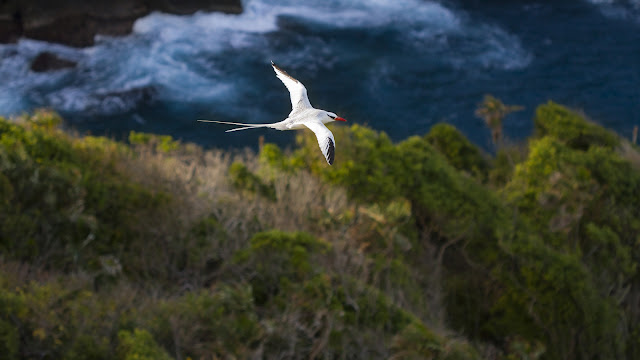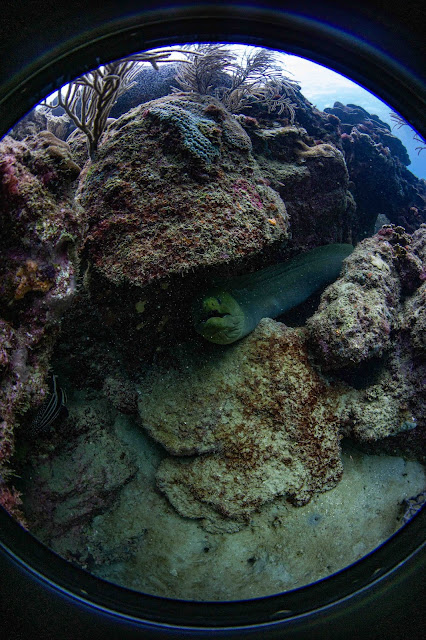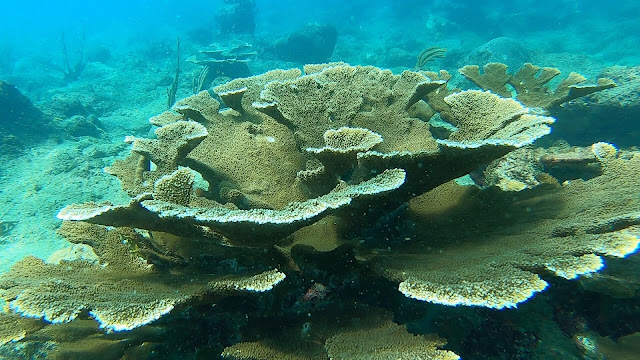NO SANDALS ON OUR REEF AND WETLAND
There are many reasons to be cautious and reconsider the proposed Sandals resort on the “Golden Grove estate,” in fact in any part of Tobago. Leaving aside the obvious top reasons – this kind of accommodation is passé for the nimble experience-driven younger traveller; a 1000-room hotel is at odds with the new brand direction for Tobago as a destination (unspoilt, untouched, undiscovered); and in the time it takes to build we will lose the “unspoilt” – we need to forego this construction project in favour of retaining the habitats that best protect (Southwest) Tobago against climate change. Marine Scientist Dr Anjani Ganase raises an objection on behalf of Tobago.
In the face of climate change – which it seems people with temporary tenures like Trump do not need to believe in – we must retain the mangrove ecosystem surrounding Bon Accord Lagoon, to safeguard the structure of the coastline and the marine environment including Buccoo Reef. Otherwise all of Southwest Tobago and the communities there will be severely impacted by flooding and ocean rise that no “box drain” will alleviate. We have recently had the bitter experience of what happens in a wetland habitat.
The relationship between the mangrove ecosystem at the Bon Accord Lagoon and the coral reef at Buccoo MPA is an interdependency that has evolved over thousands of years; and created a coastal marine environment rich in biodiversity above and below the waterline. These connections and services have extended to the surrounding communities for food, tourism income and protection from coastal erosion and wave impact.
 |
| Excavation and construction incursions in any – even relatively small - area of Bon Accord lagoon will surely destroy the already compromised Buccoo Reef ecosystem. |
This mangrove forest is important to many other species; it is a roosting site for resident, migratory and vagrant birds, at least 135 here in Golden Grove (Faraaz Abdool). Some of these migratory birds breed in Europe, South America and even in the Arctic Tundra, and winter in the Caribbean and South America; Bon Accord Lagoon is a crucial stopover in their life cycle. It is a known birding spot for many visitors to Tobago, which amounts conservatively (and probably only counts the internationals) to over 600 a year. Tobago is on the bucket list of global birders.
Underwater, the mangroves of Bon Accord and the seagrass and marsh serve as nurseries to an array of resident marine organisms: juvenile fish before they relocate to the reefs and into the open ocean. Fish species include snapper, grunt, grouper, sharks, as well as crab and lobsters, conch, and the ecologically important Parrot Fish, which help to maintain the health of our coral reefs (Bon Accord Bioluminescence)
Mangroves buffer wave action and encourage settlement of sediment; the root system traps land runoff and pollutants keeping the surrounding waters clear and stabilizing the coastline. The mangrove forest adjacent to Bon Accord Lagoon extends inland and along the shore; and any expansion is reflective of their buffering capacity.
If we remove the mangrove habitat, we lose the Buccoo Reef marine park. And even though this marine park still needs to be more effectively managed, it nevertheless functions in providing habitat to important fish species to grow. It still buffers against the wave action and maintains the sheltered Bon Accord lagoon environments. Buccoo reef extends to depths well beyond the surf and it is the living structure that is important for the stability of the area. Yes, we have killed larger sections of the shallow of Buccoo Reef but there is a living reef deeper down.
We may not see it, but this reef is a habitat to be conserved, and a barrier in climate change. As a signatory to the COP 21, Trinidad and Tobago can, and must, play its exemplary role as an important Caribbean state. Let us all become aware of the findings in the latest report by the Intergovernmental Panel for Climate Change, (IPCC) a precious document corroborated by thousands of scientists globally, including our own at The University of the West Indies, Professors John Agard, Michael Taylor and Leonard Nurse among others. Small-island nations are most at risk to predicted impacts of coastal erosion, saltwater inundation, loss of fisheries stock, habitat loss and economic damages. More than ever we need to educate and empower citizens, to actively protect these mangrove forests.
Climate change is not a down-the-road priority. It is happening now and we need to act urgently in order to save businesses, communities and the lives and livelihoods of our most vulnerable citizens. The best strategy against climate change is to maintain diversity in our natural ecosystem to allow space for species to adapt. We need nature – our forests, our streams, and our wetlands - to adapt because nature is the source of food, income and water.
If the mega-resort were to be built as declared in the CEC, the construction phase alone will destroy the stability of this ecosystem. The combined impacts of sediment along with the direct removal of part of the habitat will permanently alter the lagoon.
This begs another question, how do we expect to compete with the tourism industry that is well developed in neighbouring countries by trying to be exactly like everyone else? This venture will fail because the island of Tobago is not like everywhere else. Every wet season we are flushed with the run off from the Orinoco, which has resulted in a unique marine reef system that is like no other in the Caribbean. How are we going to protect our citizens and communities without innovation; and indeed by adopting a model that is already outdated?
We need to get ahead of the game, to leapfrog the old tourism model that has been deemed unsustainable and environmentally and socially destructive. Tobagonians have discovered this with incredible projects that citizens are working, with tiny budgets. Visit Castara a community that has learned what their biggest asset is. Visit Charlotteville, where an income-generating scientific research and conservation enterprise is an example for modern-day tourism. Read the proposed National Protected Areas Systems Plan, which will put us on the map for the percentage of area protected. This Plan will surely solidify Tobago as a true ecotourism destination; and without the significant and burdensome costs of a contrived construction project.
Tobago does not need saving, Tobago needs to be given a chance. Maybe Sandals will bring intentions to re-grow (mangrove) forests and attempt to create artificial reef, but no investment will ever replace the original habitat. No restoration project will ever bring the ecosystem and its benefits back.
Let us learn to utilize Tobago’s natural assets – the diversity of nature and its people - instead of importing an alien system. Let us learn from where we may have fallen short in the Hilton Tobago/Magdalena. There is a global recognition of Buccoo reef as synonymous with Tobago’s identity, yet we stand to lose this icon if we replace it with a franchise that does not even belong to Trinidad and Tobago. Coral reef related activities bring in about 40 % of the visitors to the island annually (Burke et al. 2005). In 2006, expenditure, which includes accommodation, for direct reef related tourism amounted to US$ 43.5 million (15 % of Tobago’s GDP at the time), while indirect reef related activities (food and beverage, rental equipment) added another US$ 58–86 million (Burke et al. 2005). And all without a national budget contribution to this natural resource.
I believe there are enough of us (marine scientists, conservationists, tourism entrepreneurs) to help develop something indigenous and close to our hearts. We can set Tobago apart from ordinary, and cherish our island “unspoilt, untouched, undiscovered,” so that every visitor experience is barefoot and unique.
References:
Burke, L., Greenhalgh, S., Prager, D. and Cooper, E.. (2008) Coastal Capital–Economic Valuation of Coral Reefs in Tobago and St. Lucia. World Resources Institute, Washington, DC, 76 pp.
Goreau, T. F. 1967. Buccoo Reef and Bon Accord Lagoon, Tobago: Observations and Recommendations Concerning the Preservation of the Reef and its Lagoon in Relation to Urbanisation of the Neighbouring Coastal Islands. Memorandum to Permanent Secretary (Agriculture), Economic Planning Unit, Prime Minister’s Office, Government of Trinidad and Tobago, 8 pp.
Food and Agriculture Organisation of the United Nations (FAO). (2018). National Protected Area Systems Plan for Trinidad and Tobago. Government of the Republic of Trinidad and Tobago, Port of Spain, Trinidad. Draft document submitted to the Government of the Republic of Trinidad and Tobago for approval
IPCC (2018) Global Warming of 1.5 C, Summary for policymakers.


